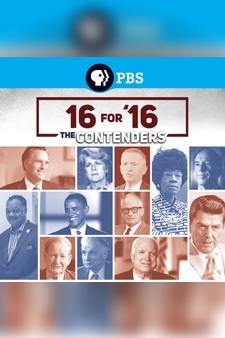
16 for '16- The Contenders Season 1 Episodes
Season 1 Episode Guide
Episode 1 - The Straight TalkersAmerican voters say they prefer their politicians honest, but does being a straight-talker actually have negative consequences? John McCain, a war hero turned foot soldier in the “Reagan Revolution”, was considered a maverick within his own party for always speaking from the heart even when it wasn’t politically expedient. His first run in 2000 saw one of the more brutal, knockdown drag-out fights between his campaign and that of the ultimately victorious George W. Bush. Eight years later, despite his storied record in the Senate and a headline-making choice for Vice President, he found his run for the Presidency upended by the presence of a certain history-making newcomer. Shirley Chisholm, a black woman who dared to run for Congress just three years after African Americans saw the passing of the Voting Rights Act, could be described the same way. She was a bold straight-talker who didn’t want to wait her turn to follow an African-American man or a white woman running for President--she saw an opportunity and she took it for herself, smashing multiple glass ceilings in the press conference announcing her candidacy. For both John McCain and Shirley Chisholm, part of the reason they ran is that both of these folks were supremely un-bought and un-bossed. It could also very well be the reason they lost. |
Episode 2 - The FlamethrowersPolitics can be a bit of a snooze fest, conventional candidates saying the same old, same old. But every now and then you get an insurgent, a flame thrower, someone who wants to shake things up. Back in 1992, that person was conservative commentator, writer and pundit Patrick J. Buchanan, who not only ran for the presidency of the United States, but ran against a sitting president in his own party. His first run was a reaction to George H. W. Bush’s broken promise of “No New Taxes”, pushing a conservative party platform that ignited a fire underneath conservatives on the far right. Fast forward a dozen years later and Howard Dean, the governor of the small state of Vermont, throws his hat into the ring. Dean was able to light a fire underneath young Americans with his progressive ideals, spirited rhetoric, and previously underutilized Internet presence. Dean’s campaign is credited with introducing an online fundraising model that the Obama campaign went on to perfect in 2008. On the surface, Buchanan and Dean couldn’t be more different, but at their core, they both fundamentally wanted to change things. Not just a little bit, but a whole lot. |
Episode 3 - The TechnocratsCan you win the Presidency on integrity and talent alone or do you need to get dirty in the sandbox? Will you come out the other side with your hands still clean? Michael Dukakis and Mitt Romney may have been two of the most talented people ever to run for president-- Harvard Law graduates, successful governors of Massachusetts with reputations not only for technocratic efficiency but for integrity as well. They were both known for finding common ground across party lines and getting things done. So why did neither man make it all the way to the White House? Therein lies the real heart of what it takes to become President. The campaigns of Michael Dukakis and Mitt Romney show talent alone is not enough. Dukakis was done in by the opposition’s efforts to paint him as weak and fragile, and he refused to play dirty. It didn’t help matters that he insisted on campaigning three days a week, with the other four days solely committed to the needs his Massachusetts constituents. While Mitt Romney was able to overcome attacks on his religion, it was his vast wealth that eventually alienated him from many of his initial supporters. The ability to define yourself as a candidate and perhaps most importantly, the ability to refashion the picture painted by the opposition is key. |
Episode 4 - The VisionariesThe 1980s were a decade of big ideas and bigger personalities. Ronald Reagan crushed Jimmy Carter in a landslide and took it as a mandate to create his vision of America. But there were two substantial contenders laser-focused on cutting short Reagan's livelihood. Gary Hart was a senator from Colorado who thought there was a fundamentally different opportunity for how the world could come together. His ideas were novel and extremely progressive, but after an explosive personal scandal never before seen in politics, he withdrew from the race, leaving many to wonder what a Hart presidency would have looked like. Jesse Lewis Jackson of South Carolina was a civil rights leader whose mantra was “I Am Somebody!”. Both Hart and Jackson were first in their families to graduate from college, and they used their educations to maximum effect. Ending the Cold War, promoting the use of technology, encouraging diversity - both men were original thinkers and extremely ahead of their time. While neither made it to the White House, their presences pushed the Democratic party more to the left. Their candidacies shocked the Establishment by leaping to the front of the pack for a moment in time. |
Episode 5 - The ConservativesEven today, most Republicans worth their flag pins shout out Ronald Reagan and align themselves with his brand of conservatism. It's desirable for a Republican candidate to be named the spiritual heir to Ronald Reagan. But for Reagan himself, that ideological inspiration came from Arizona senator Barry Goldwater. In 1964, Barry Goldwater, all chiseled jaw and strong beliefs, defined what it meant to be a conservative. He pulled the Republican Party away from the northern elites and planted it firmly in the South and the West. So why did he lose? His run for the presidency came only a year after the Kennedy assassination, and Goldwater was unable to convince an internationally unstable America that his presidency wouldn't end in nuclear annihilation. But his version of conservatism ultimately sowed the seeds for Ronald Reagan, then a Hollywood actor to enter politics with a speech on the convention floor. Reagan debuted his winning oratory, but the rest is not history. It's a testament to the strength of his legacy that many forget that he lost a primary challenge to President Gerald Ford in a heartbreak of a race in 1976. His concession speech, improvised with only a few seconds notice, left many at the Republican National Convention thinking that their re-nomination of Ford may have been a mistake. It's rare that two people who lost could become such influential members of their parties, but it has been said that while Goldwater and Reagan lost their races in ‘64 and ‘76, they actually won the future. |
Episode 6 - The IndependentsAs a nation we've become used to the idea that running for president is a two-party affair, but as we've seen recently, that's not the way it has to be. Over the last quarter of a century, two very bold candidates have run as third-party contenders. In 1992, it was Ross Perot, a short Texas billionaire with a distinctive twang and a bold, refreshing, no-nonsense approach. He launched his campaign on a lark during a charming interview on Larry King Live, his appearance going “viral” and creating a strong “Draft Perot” movement. But as he shot up in the polls, his opponents George H.W. Bush and Bill Clinton were forced to take him very seriously, and this was the very first time a third party candidate had such a strong support base. Ralph Nader spent decades in the public eye and affected the lives of millions of people around the world as a consumer advocate, but after jumping into the ring for the 2000 election, he is now best remembered as an independent party contender who may have changed the course of history. You can call these third party candidates difficult, fearless or risible but whatever you do, don't call them spoilers. |
Episode 7 - The TrailblazersIt has to happen eventually--a ceiling-smashing moment in campaign history. The selection of Geraldine Ferraro as the first woman on a major party U.S. presidential ticket catapulted Walter Mondale's campaign from dull to dazzling. The jolt provided by the former prosecutor and Congresswoman from Queens, New York helped the ticket pull even with Ronald Reagan and George Bush in the polls. Her entrance onto the world's stage at the Democratic National Convention in 1984 was an important moment in women's history, made all the more captivating by the fact that the audience that day was 80 to 90% women. 2008 saw another important moment take place on the other side of the aisle--the world's introduction to Sarah Palin. Brought onto John McCain's campaign to add energy and excitement in the face of the history-making Obama campaign, Palin was able to give Republican voters the feeling that their party could also be groundbreaking and provocative as well. And like Ferraro two decades earlier, she raised the interest level in the vice presidential slot beyond anything that had come before. The most consequential number two picks in history, both women dealt with attacks that were not just political but highly personal. Not just their competence, but their looks, dress sizes, marriages, and finances were also raked over the coals as they fought to break the glass ceiling. |
Episode 8 - The Master StrategistsThe son of a former president. The son of a Kenyan and Kansan academics. A former large state governor. A community organizer. George W. Bush and Barack Obama are at opposite ends of the political spectrum. Yet somehow the two men ended up in the same rarefied class of presidents who could be called master politicians. Bush, with the help of his campaign strategists, survived a vicious fight against John McCain for the Republican nomination, and went on to win one of the closest and most controversial elections in U.S. history, defeating Al Gore by only a few hundred votes. He became a wartime leader early in his presidency, and to this day remains one of the most polarizing presidents in the nation's history. When Barack Obama announced his campaign in 2007, his popularity was low, and he was trailing Hillary Clinton by thirty points in the polls. He mobilized a grassroots campaign of young Americans relying heavily on the internet, utilizing revolutionary online fundraising models and effectively re-writing the presidential campaign playbook. Both of these two-term presidents were able to beat serious, big ticket contenders such as John McCain, Hillary Clinton and Mitt Romney with a combination of pitch-perfect messaging, careful and calculated campaign strategy, and the very best teams of rivals in the business. |
More movies and TV shows at the American TV Listings Guide..
In order to keep our service free we display advertising and may earn affiliate fees for purchases you make on external sites that we partner with.
All content is © 2024 On TV Tonight unless pertaining to advertisers, companies, studios, movies and TV series listed on this site.

